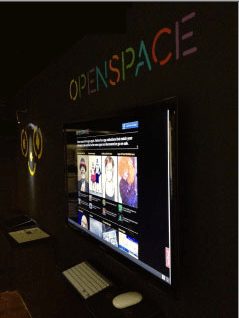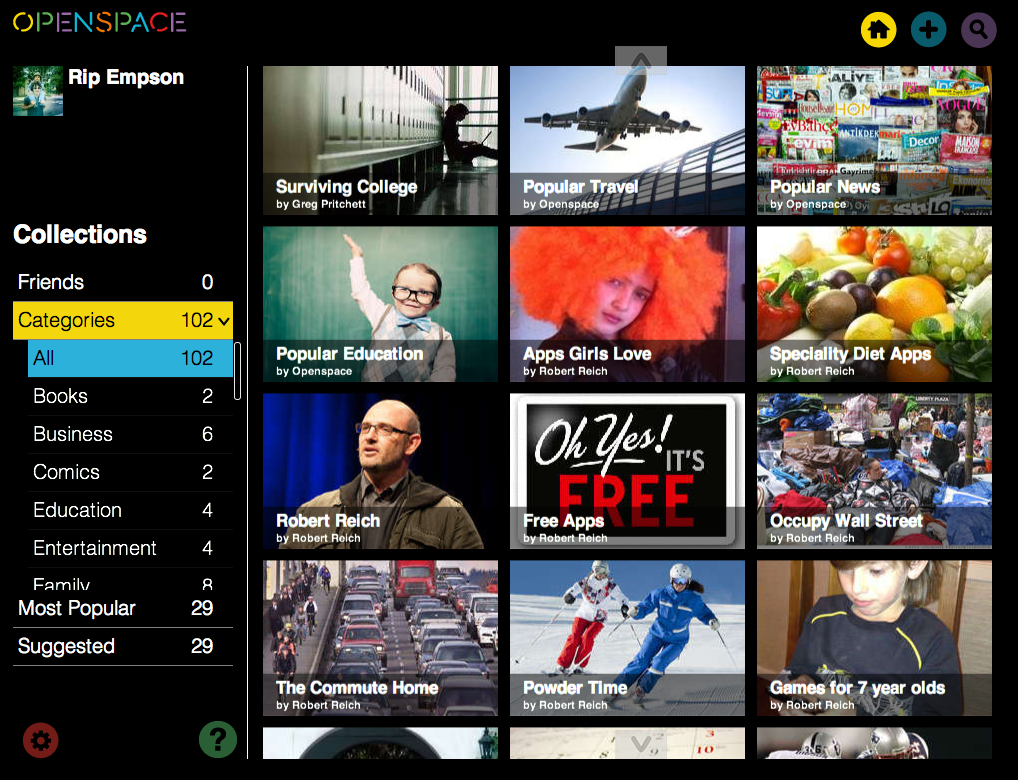Yes, when you think of an “app store”, you probably picture iTunes, the Android Marketplace, or even the Chrome Web App Store or GetJar. That’s because apps live in our browsers and on our mobile devices, right? Sort of. Robert Reich, the Co-founder and CEO of Openspace looks down the road and sees the app-ification of everything — a time when apps will become more like CDs, real, tangible goods — something more than a transitory download.
Maybe that sounds a little crazy — just as it probably sounds crazy that Openspace launched an actual brick and mortar “app store” this week in downtown Boulder, Colorado. Which might lead you to think, “but how many brick and mortar CD outlets are left? Isn’t this a little backwards? Apps live on our phones, only sometimes in our hearts, but not in the real world, right?”
Reich is fully aware that launching a brick and mortar app store sounds like a silly idea, and he and his team have a sense of humor about it, leading some to ask if it’s a publicity stunt. Of course, it’s not at all: Reich and team are considering opening similar real-world app stores in San Francisco and New York.
But why? The reason for launching a brick and mortar app store is best seen in context with what Openspace — the startup itself — is all about. Openspace launched back in April with the mission to let developers and users bypass app store and operating system fragmentation (and limitations in distribution and monetization channels) by offering an app store that enables you to discover and purchase an application once and use it anywhere, anytime, on any device –- smartphones, tablets, laptops and desktops, Mac or PC.
Accompanying its launch was a complementary developer co-op, designed to govern its app store. As the Openspace founders (Reich included) are app developers themselves, the motivation behind the cooperative was, as I wrote at the time:
The reclamation of app monetization and distribution strategies by — and for — developers. By signing up for the co-op, developers can help set the agenda and write the rules that govern the sale of their apps on the Openspace store.
Thus, Openspace’s newly launched web app store is attempting to solve the problems inherent in today’s popular app stores, specifically, the fact that there’s a lot of noise — the App Store has categories, but as many know, it’s hard to drill down to subgroups within these categories, and it’s become (with over a million apps published) increasingly difficult for developers to get their apps seen and discovered.
Services like Chomp have launched cool algorithmic search engines to help users discover apps amidst the fracas, and Openspace is combining algorithmic search with good old-fashioned curation and crowdsourcing, via a slightly different approach: Collections.
To add more granularity to the process of app discovery, search, and enjoyment, Openspace organizes apps by collections, which means that you can browse by “Interests” (sports, food, and so on), or you can go beyond that and create more refined (and specific) collections, like “Gluten Free Living”, for example. Openspace offers a “Community” section, too, where anyone can create a collection for other people to browse.
Of course, Reich tells me that creating collections is naturally a process that much of the app-consuming public may be resistant to doing, because it takes time. That’s why Openspace has added a “follow” button, which allows users to follow certain categories that they like, and when new apps are published to the category (Openspace crawls app stores every day), they get an email. Users also receive emails on sales, deals, and so on.
It’s with this community feel in mind that Openspace decided to portion off 300 square feet of their Boulder offices to create its real life, brick and mortar app store, complete with “App Guru” staffers (a la Mac Geniuses) that can make recommendations of the best apps in certain categories and help people find the best fitness app, for example.
Reich tells me that their Boulder store has already seen quite a bit of foot traffic this week. When I expressed a bit of surprise, the Openspace Co-founder reminded me that the average American is now carrying around a mobile supercomputer that, while appropriately “user friendly”, still causes a lot of anxiety. It’s a bit like FoMo — here you have this powerful tool with tons of different capabilities, but a lot of people are anxiety-ridden when it comes to getting the most out of their device. And apps are the main culprit.
The co-founder said that they’ve been seeing moms, dads, and even grandmas, who are coming into the store saying that they’re looking for the best calendar apps — iCal is no longer cutting it — so can you help me find the best one? The average smartphone and app user (especially in the older demographic) relishes the opportunity to have these kind of educational conversations one-on-one, rather than in a one-way dynamic like you might find on Google or reading a blog post.
That being said, a lot of users and visitors to the Boulder store have been questioning Openspace, are they being paid to recommend certain apps? Reich assures me that this is far from the truth; App Gurus and Openspace at large will be recommending apps that the community finds most relevant, that they themselves use. That’s why they think categories can be so great for developers, as an Openspace iPad user can view 12 app collections at once, with 50 apps in each collection. There’s a much greater chance for visibility there than there is on a traditional app store.
While the startup hasn’t secured it’s revenue models yet (though it has raised $1 million to date from The Foundry Group, David Cohen of TechStars, among other angels), Reich says that they’ve already been getting a lot of interest from app developers. Why? Because to get the most of some apps, the ideal scenario would allow developers to work directly with their users to coach them on how to get the most out of their apps. This obviously isn’t necessary for casual games, but for apps with deeper, more complex functionality, it’s nearly impossible to get this kind of face-to-face access to individual users.
The more you dive into Openspace’s approach, the more you come to realize that they are onto — if nothing else — an idea worthy of testing. Real, live app stores may prove to have little use in today’s culture, but Reich is a smart guy, and my sense is that they just may be onto something here.
I’ll leave it at that, but Openspace is definitely worth checking out. And, if you happen to be in Boulder, drop by and then pop in here to tell us about your experience.

